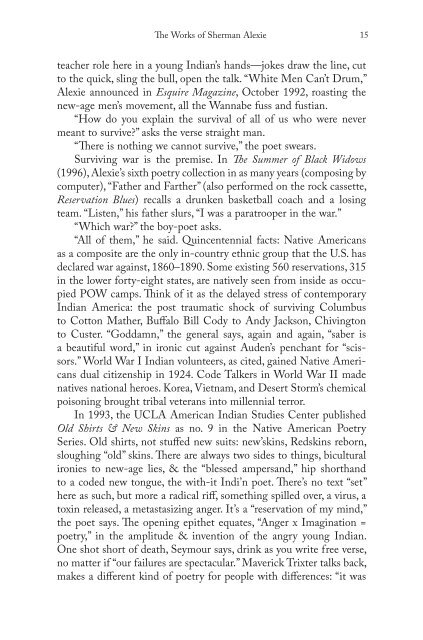Blooms Literary Themes - THE TRICKSTER.pdf - ymerleksi - home
Blooms Literary Themes - THE TRICKSTER.pdf - ymerleksi - home
Blooms Literary Themes - THE TRICKSTER.pdf - ymerleksi - home
You also want an ePaper? Increase the reach of your titles
YUMPU automatically turns print PDFs into web optimized ePapers that Google loves.
Th e Works of Sherman Alexie 15<br />
teacher role here in a young Indian’s hands—jokes draw the line, cut<br />
to the quick, sling the bull, open the talk. “White Men Can’t Drum,”<br />
Alexie announced in Esquire Magazine, October 1992, roasting the<br />
new-age men’s movement, all the Wannabe fuss and fustian.<br />
“How do you explain the survival of all of us who were never<br />
meant to survive?” asks the verse straight man.<br />
“Th ere is nothing we cannot survive,” the poet swears.<br />
Surviving war is the premise. In Th e Summer of Black Widows<br />
(1996), Alexie’s sixth poetry collection in as many years (composing by<br />
computer), “Father and Farther” (also performed on the rock cassette,<br />
Reservation Blues) recalls a drunken basketball coach and a losing<br />
team. “Listen,” his father slurs, “I was a paratrooper in the war.”<br />
“Which war?” the boy-poet asks.<br />
“All of them,” he said. Quincentennial facts: Native Americans<br />
as a composite are the only in-country ethnic group that the U.S. has<br />
declared war against, 1860–1890. Some existing 560 reservations, 315<br />
in the lower forty-eight states, are natively seen from inside as occupied<br />
POW camps. Th ink of it as the delayed stress of contemporary<br />
Indian America: the post traumatic shock of surviving Columbus<br />
to Cotton Mather, Buff alo Bill Cody to Andy Jackson, Chivington<br />
to Custer. “Goddamn,” the general says, again and again, “saber is<br />
a beautiful word,” in ironic cut against Auden’s penchant for “scissors.”<br />
World War I Indian volunteers, as cited, gained Native Americans<br />
dual citizenship in 1924. Code Talkers in World War II made<br />
natives national heroes. Korea, Vietnam, and Desert Storm’s chemical<br />
poisoning brought tribal veterans into millennial terror.<br />
In 1993, the UCLA American Indian Studies Center published<br />
Old Shirts & New Skins as no. 9 in the Native American Poetry<br />
Series. Old shirts, not stuff ed new suits: new’skins, Redskins reborn,<br />
sloughing “old” skins. Th ere are always two sides to things, bicultural<br />
ironies to new-age lies, & the “blessed ampersand,” hip shorthand<br />
to a coded new tongue, the with-it Indi’n poet. Th ere’s no text “set”<br />
here as such, but more a radical riff , something spilled over, a virus, a<br />
toxin released, a metastasizing anger. It’s a “reservation of my mind,”<br />
the poet says. Th e opening epithet equates, “Anger x Imagination =<br />
poetry,” in the amplitude & invention of the angry young Indian.<br />
One shot short of death, Seymour says, drink as you write free verse,<br />
no matter if “our failures are spectacular.” Maverick Trixter talks back,<br />
makes a diff erent kind of poetry for people with diff erences: “it was

















